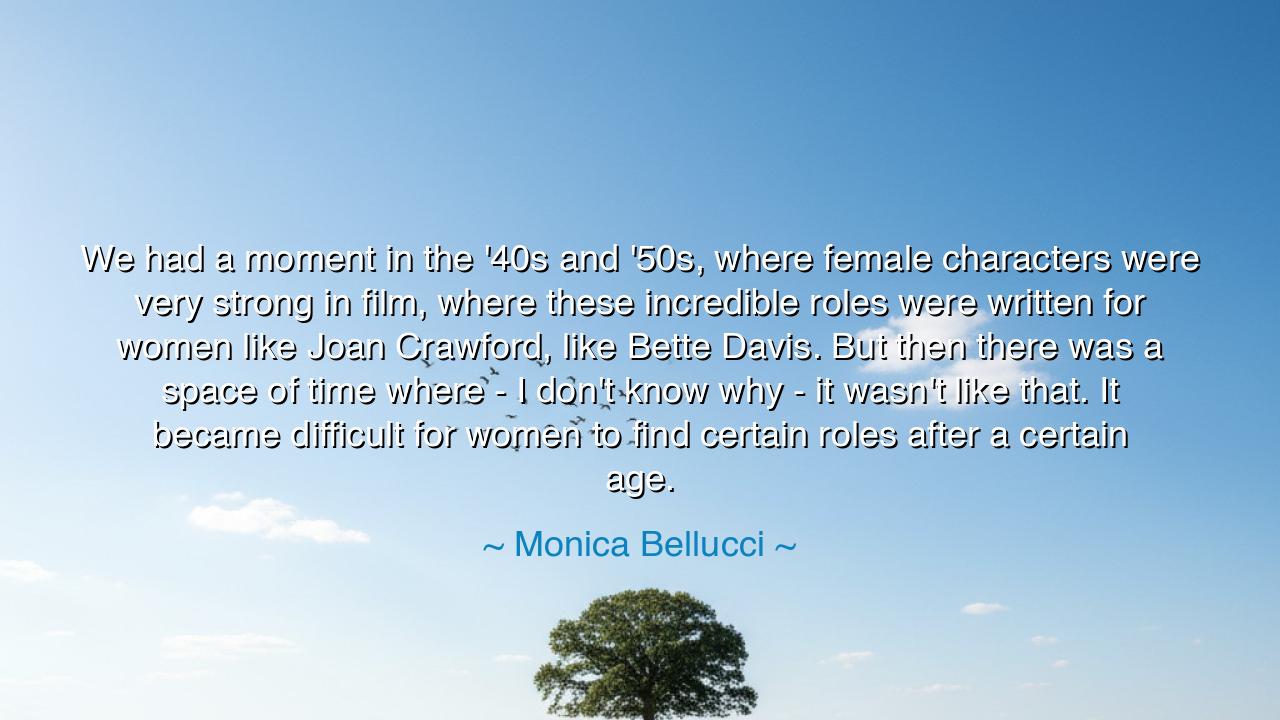
We had a moment in the '40s and '50s, where female characters
We had a moment in the '40s and '50s, where female characters were very strong in film, where these incredible roles were written for women like Joan Crawford, like Bette Davis. But then there was a space of time where - I don't know why - it wasn't like that. It became difficult for women to find certain roles after a certain age.






Listen well, O children of the future, for there are truths that echo through time, carried on the voices of those who have witnessed the rise and fall of greatness. Monica Bellucci, a modern voice of wisdom, speaks of a time when the world of film was a place where female characters stood as giants, strong and unyielding. She says, “We had a moment in the '40s and '50s, where female characters were very strong in film, where these incredible roles were written for women like Joan Crawford, like Bette Davis. But then there was a space of time where - I don’t know why - it wasn’t like that. It became difficult for women to find certain roles after a certain age.” These words are a reflection of the tides of history, where the light of progress has often flickered and dimmed, only to rise once more.
In the golden age of cinema, when the world was rebuilding from the ashes of war, there arose a flame of empowerment. Women like Joan Crawford and Bette Davis were not merely actresses; they were forces of nature. They embodied strength, determination, and independence, becoming symbols of what women could achieve in a world that sought to suppress them. They were warriors on screen, conquering the hearts of audiences and making a mark upon the world that would never fade. Their roles were not just characters; they were voices of a generation, demanding attention, respect, and equality.
But as time passed, the world changed, and with it, the roles for women in film began to shift. The bright flame that once burned so brightly seemed to flicker, and a new era arose where women were relegated to secondary roles, their characters reduced to mere shadows of their former selves. As Monica Bellucci observes, this shift was not gradual but marked by a silence, a void where once there was strength and presence. Why did this happen? What caused this sudden diminuation of female power? The answer is elusive, but the effect was clear: the industry, for reasons unknown, grew more resistant to embracing the strength of women as they aged, and the roles that once empowered them became scarce.
The ancient world too knew such patterns. The Greeks had their goddesses, powerful figures like Athena, the goddess of wisdom, and Artemis, the huntress. These women were not merely symbols of beauty or grace; they were leaders, warriors, and protectors. But as time wore on, the feminine power that once commanded reverence became overshadowed by more dominant forces. The Roman Empire, in its might, would focus less on the goddesses and more on the heroes of men. Yet, despite these shifts, the goddesses remained within the hearts of those who could see the truth of their strength, just as the great women of cinema would rise again, though their voices were often muted.
Monica Bellucci's words remind us that the struggle for representation and equality is a long and winding road. It is a reminder that, while the world may shift and change, the power of women, their voices, and their stories, is eternal. It is also a call to action—a demand that we do not accept the erasure of powerful female figures in film or in life. The goddesses, whether in ancient myth or modern cinema, must be allowed to shine without limitation, without judgment, and without age being a barrier to their strength.
So, O future generations, take this lesson to heart: do not allow the world to diminish the power of those who have paved the way for us. Women, in all their forms, deserve to be seen, to be heard, and to have their stories told at every stage of life. Their strength does not fade with age, nor should their roles be limited by time. It is upon us, as bearers of wisdom and as creators, to lift up these voices, to see that strong women—whether on screen, in the halls of power, or in our everyday lives—are never silenced. The world needs their strength, their wisdom, their leadership. Let their stories be told, let them be seen, and let them rise again to their rightful place, side by side with those who shape the world.






AAdministratorAdministrator
Welcome, honored guests. Please leave a comment, we will respond soon